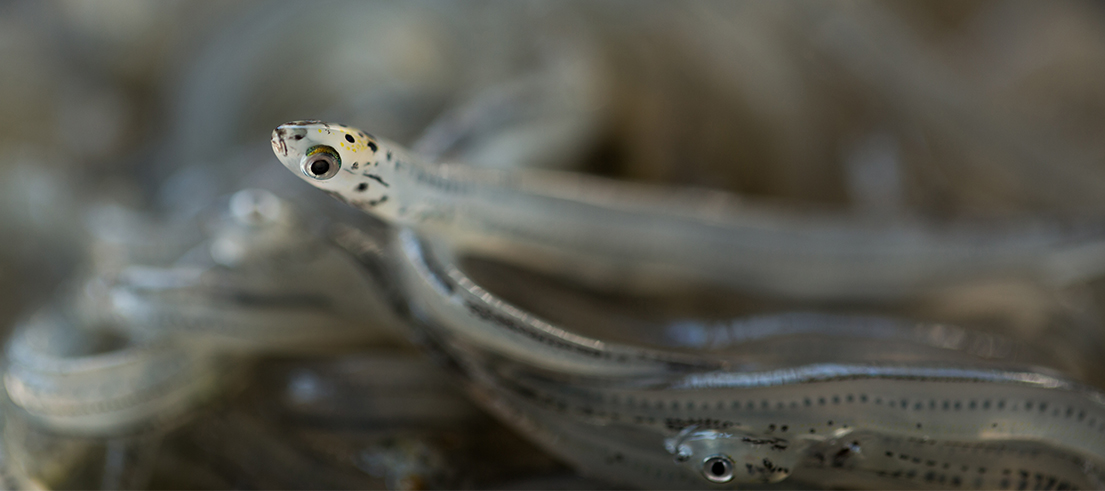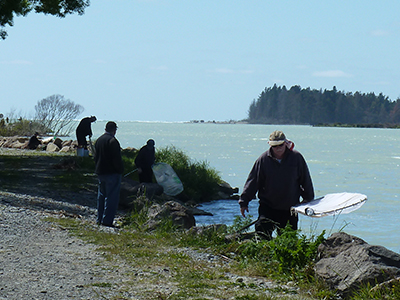
Understand the regulations for whitebait fishing
Whitebait plays an important role in our ecosystem and in our culture, as a national delicacy. It is also an important traditional source of kai for Māori.
Whitebait are the juveniles of six species of fish. Four of the six New Zealand whitebait species are classified as at risk or threatened.
Whitebait fishing regulations were revised in 2021 to improve the sustainability of the species.
The Department of Conservation (DOC) is responsible for managing whitebait fisheries.
Season dates
The whitebait fishing season runs from 1 September to 30 October inclusive nationwide (except for the Chatham Islands). On the Chatham Islands, the season runs from 1 December to the last day of February inclusive.
Our role in whitebaiting regulations
As a regional council, we manage the licensing of what are commonly known as "stands". A stand is any structure authorised to be used to fish for whitebait under the Resource Management Act (RMA) 1991.
Our main interest is ensuring these structures don’t interfere with waterway ecosystems and our flood management infrastructure.
Protecting waterways
In Canterbury, permanent and temporary structures are not allowed to be built on the bank or bed of a waterway.
Our Regional Leader of Compliance Monitoring, Steve Firth says structures can cause ‘serious environmental impacts’ and have been an issue previously.
"Structures can change the hydraulics of the river and cause bank destabilisation, flood risk, and sediment issues, which impacts the habitat of native plant and animal life," he said.
"Concrete plinths, wooden platforms, and pallet jetties are some of the structures that have been removed in the past.
"We ask all whitebaiters to fish from the bank without the use of structures. Doing this creates an equal opportunity for everyone fishing in the community and will avoid action being taken under the RMA."
Key rules for the use of stands
- Permanent and temporary structures are not allowed to be built on the bank or bed of a waterway.
- You must not fish within 20 metres of any: tide gate, floodgate, confluence, culvert, weir, groyne, outfall structure, or unlawful diversion. You’re also not allowed to fish from any bridge or vessel.
- Screens are the only device allowed to divert whitebait into a net. They are limited to three metres maximum length, except from a stand where fishing gear length (including screens, nets, pulleys, ropes etc) is a maximum of six metres.
Visit the DOC website for more whitebaiting rules and regulations. If you have specific whitebaiting questions, email whitebait@doc.govt.nz.
Warning about detergent and outdoor burns
At this time of year, we remind whitebaiters not to use detergent or cooking oil in the waterways.
"It is illegal to discharge these products as they can be very harmful to river ecology and the fish that live there," Steve said.
While enjoying the outdoors, avoid air pollution and stay safe by not making fires on the banks of urban streams, rivers, or regional rivers.
"Most people are doing the right thing but, for those that aren’t, we want to ask them to comply with the regulations to protect the environment and avoid fines."
How do I report issues?
If you see an activity while out using the waterways that could be damaging the environment, please call Environment Canterbury on 0800 765 588 (24 hours), or use the Snap Send Solve app to report an issue from your mobile phone.
If you are worried about the safety of property or persons, then dial 111.
Find out more
- Visit DOC’s website for a summary of whitebait fishing regulations.
- Read the Whitebait Fishing Regulations 2021 on the New Zealand Legislation website.
- View information on outdoor burning.
- View information on using regional parks.

